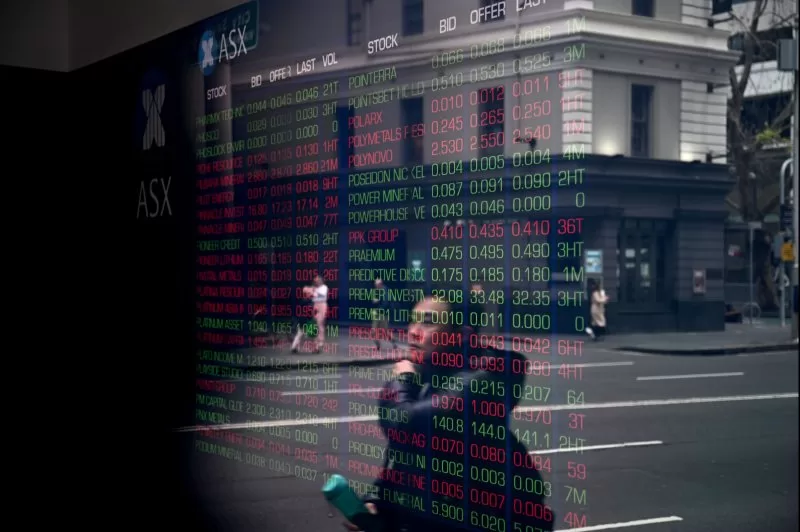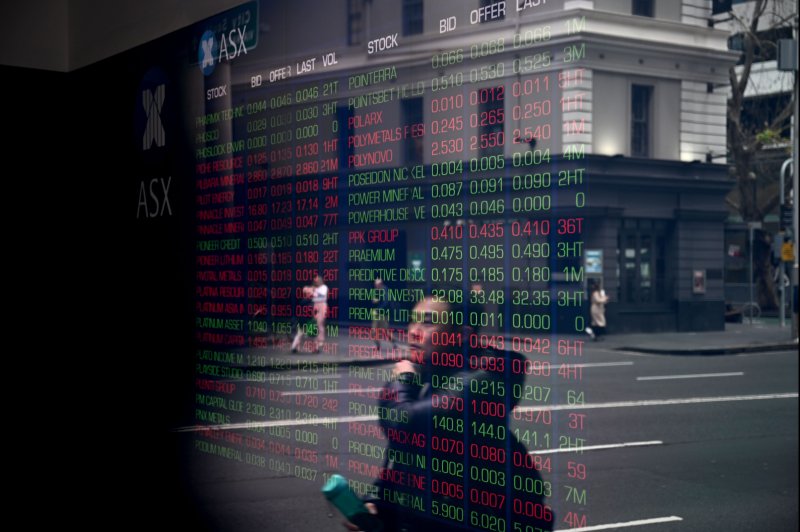A passing pedestrian is reflected in the windows of the Australian Securities Exchange in Sydney on Monday. The bourse’s ASX 200 index fell by 3.7%, to 7,650 points in Monday’s Asia-wide sell-off, its lowest level in two years, wiping $100 billion off the value of stocks. Photo by Bianca de Marchi/EPA-EFE
Aug. 5 (UPI) — European stock markets opened sharply lower Monday after Japan’s benchmark Nikkei 225 index saw its biggest-ever sell-off, ending the day in Tokyo down 4,451.28 points after investors spooked by fears of a U.S. recession dumped shares.
The main indexes of Germany and France — the DAX and the CAC 40 — both dropped by almost 3% as soon as trading got underway while in London, the benchmark FTSE 100 index fell 168 points, or 2.19%, its biggest fall in a year.
The pan-European Stoxx 600 index was off 2.6% with all sectors affected, led by tech, energy, carmaker and mining stocks.
The euro and pound, however, both strengthened against the dollar after a weak U.S. jobs report from the Labor Department on Friday triggered fears of an economic downturn in the world’s largest economy that sent all three major U.S. indices into a tailspin.
That came on top of a Fed Reserve decision on Wednesday to keep interest rates on hold at 5.25%-5.50% with the disappointing payroll data suggesting the U.S. central bank had left it too long to start cutting rates.
“Across almost all key risk markets, valuations are adjusting to a growing fear that the Fed has left it too late to begin the process of neutralizing its tight monetary policy,” Kallum Pickering, chief economist at Peel Hunt told The Telegraph.
“The United States is the world’s most systemically important economy. Downside surprises there could have far-reaching consequences for open economies and may influence the upcoming decisions of global central banks.”
The European selling was sparked by a crash that saw the Nikkei slump from Friday’s 35,249.36 point-close to bottom out at 31,156.12 just before the market closed Monday afternoon before recovering slightly to 31,458.42, down 12.4%, with markets in China, Hong Kong, Taiwan, South Korea, India and Australia following suit.
The Topix, the Japanese equivalent of the S&P 500, fell more than 12% with the country’s big industrials including Mitsui, Mitsubishi and Sumitomo all falling by more than 14%.
Nikkei and Topix futures trading was temporarily paused at the Osaka Securities Exchange after circuit-breakers kicked in to arrest panic selling.
The Bank of Japan lit the match Wednesday by raising interest rates for only the second time in nearly two decades — from 0.1% to 0.25% — and signalling there would be more hikes to follow, triggering two days of selling going into the weekend that saw the Nikkei lose more than 3,000 points.
However, Nomura Securities chief strategist Naka Matsuzawa said the sell-off had to be seen in the context of growing “risk-off” sentiment, with most of the selling by foreign investors worried about the U.S. economy.
“The fall is not really happening due to Japan-specific reasons,” he explained warning that there may be more selling to come.
“Markets are still trying to find the bottom.”
U.S. futures plunged ahead of the opening of Monday’s Wall Street trading session with Dow futures down 800 points, on top of a 600-point drop Friday, the S&P down 3% and Nasdaq-100 futures down 4% as tech stocks took a hammering led by Apple after Warren Buffet‘s Berkshire Hathaway revealed it had dumped half its stake in the iPhone maker.

